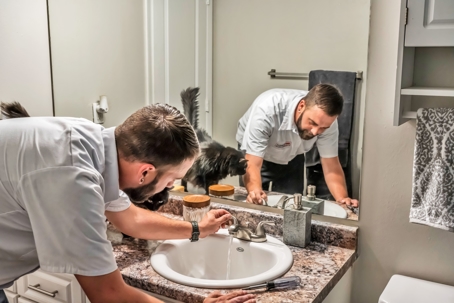Plumbing Tips From The Pros In Naples
1. Never pour grease down the drain
It is not recommended to pour grease down the drain because it can cause serious clogs and blockages. After cooking you should never put any food grease down the drain. It may be tempting to pour the hot oil down the drain, but you may clog your pipes while doing so. After grease cools down it usually turns into a white solid substance. Imagine what it's doing inside your pipes!
2. Use garbage disposal correctly
Garbage disposals are mounted underneath the sink. They are meant to grind down any wasted food that has been caught inside the drain and is also useful in eliminating odors. Your garbage disposal is meant to shred food waste into small pieces so your pipes won't get clogged. There are some items you should never put down the disposal, such as eggshells, meat, nuts, oil, and asparagus.
3. Do not flush wipes down the toilet
When wipes are flushed, they do not break down as toilet paper does. This type of behavior can lead to costly plumbing repairs. This in return can cause sewage to back up into your toilet and into your home. It is generally advised against flushing any time of wipes, including baby wipes, down your toilet. While some wipes may be labeled as flushable, they can still cause serious problems and wreak havoc in your plumbing systems. When you are ready to dispose of the wipes, it is best to throw them away inside the garbage can.
4. Use a basket drain strainer
A strainer is placed over the drain to prevent materials from entering the drain and causing a clog. They are typically used in sinks, bathtubs, and showers to catch food particles, hair, and other debris that can cause your drains to get clogged. Strainers usually are cleaned by shaking them inside the trash, or rinsing the strainer under cold water. To prevent any types of clogs in your drain, it is important to regularly clean the strainer and remove any debris that has accumulated.
5. Know the main water shut-off location
It is extremely important to know the precise location of the main water shut-off valve in your home because it allows you to quickly and easily turn off the water supply in case of an emergency, such as a burst pipe or leaking appliance. If a pipe bursts, the water can cause significant damage to your home and possessions. By turning off the water supply, you can minimize the damage and prevent further water from flowing into your home. Additionally, if you are planning to do any plumbing work, such as replacing a fixture or working on the pipes, you will need to turn off the water supply to prevent accidents and injuries. Knowing the location of the main water shut-off valve can also help you conserve water in the event of a drought or other emergency situation.
6. Stay away from chemical drain cleaners
It is generally advised to avoid using chemical drain cleaners whenever possible. While they may be tempting and effective at clearing clogs, they can also be quite harmful to your pipes and the environment. Chemical drain cleaners contain harsh chemicals that can damage your pipes, especially if they are made of metal or plastic. Over time, these chemicals can weaken the pipes and cause them to deteriorate or break. In addition, chemical drain cleaners can produce toxic fumes and can be harmful if ingested or if they come into contact with your skin. You can try using a natural drain cleaner, such as vinegar and baking soda, or an enzyme-based cleaner. These alternatives are safer for your pipes and the environment. But the safest and best option is to call a professional plumber.
7. Inspect for leaks regularly
One important task as a homeowner is to inspect your inside and outside plumbing regularly for different types of leaks. Leaks can be a sign of a bigger problem and can lead to significant water damage, mold growth, and higher water bills if left unchecked and unfixed. There are a few different ways you can inspect your plumbing for leaks. Check your water meter regularly, and look for visible signs on walls and ceiling. Sometimes you may hear a dripping sound inside the wall where the leak is located. By inspecting your plumbing regularly, you can catch leaks early on and have them repaired before they cause any significant property damage.
8. Flush the water heater
It is generally recommended to flush your water heater once a year. Doing this will remove any sediment that has accumulated in the tank. Sediment and scale can build up over time and can affect the performance and efficiency of your water heater. By flushing the tank, you can remove this sediment and help extend the life of your water heater. Most people are not comfortable flushing their water heater themselves, in this case, we recommend that you can hire a professional plumber like us, to do it for you.

